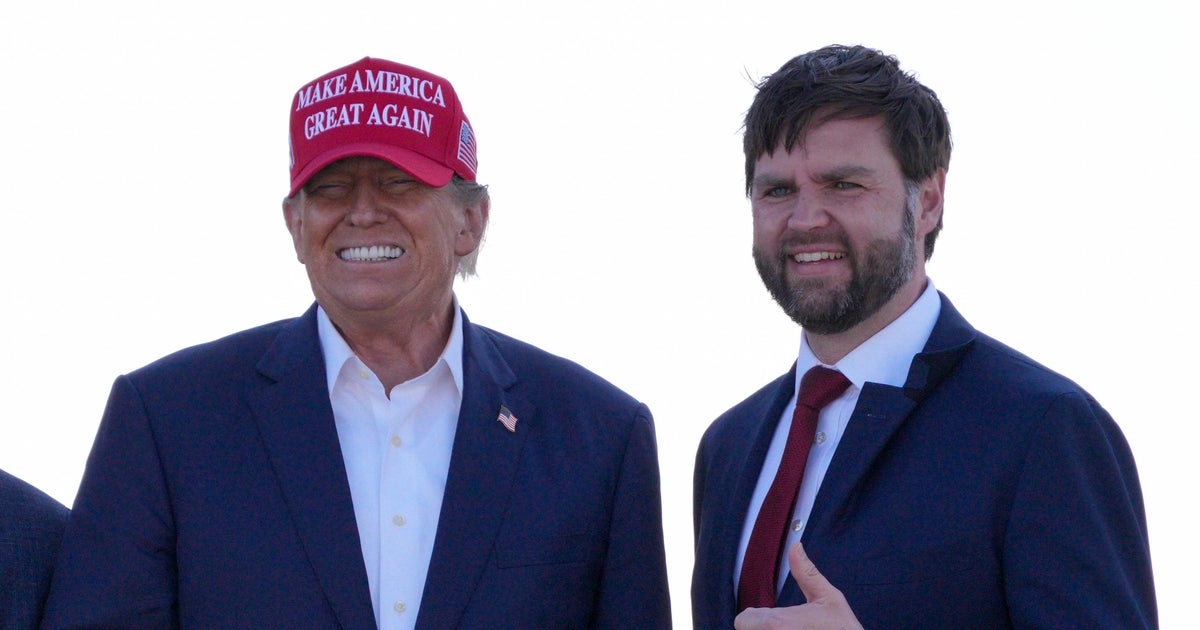Why some Americans are trading in mainstream social networks for ones that tout "freedom of speech"
The 2020 election season was flooded with misinformation about everything from the security of mail-in voting to the accuracy of election results. Facebook, Twitter, Instagram and other platforms attempted to crack down on the falsehoods being shared with flags and fact checks — but that crackdown is prompting some users to leave in pursuit of online communities with fewer restrictions.
Many right-wing individuals, citing censorship on Facebook and Twitter, have flocked to Parler, which brands itself as "unbiased social media." Other popular sites include MeWe and Ruqqus.
After Twitter hid and flagged a tweet from Fox Business anchor Maria Bartiromo that shared misleading information about election results in key states, Bartiromo tweeted that she plans to give up Twitter for Parler, and encouraged her followers to do the same.
Conservative radio host Mark Levin repeatedly asked his Facebook and Twitter followers to join him on Parler after he said Facebook issued restrictions on his page for "the repeated sharing of false news." The restrictions limited page distribution and also allowed page visitors to see that he has a history of spreading false information, according to a screenshot Levin posted on Facebook. Levin has continued to say he "may not stay at Facebook or Twitter if they continue censoring me."
Politicians including Senator Ted Cruz and Nebraska Governor Pete Ricketts have also told their followers to join the platform.
In the days following the election, the app hit the top of the charts on Apple and Google Play, according to data from SensorTower, which tracks mobile application downloads, rankings and reviews. On November 7, the app hit No. 1 for Apple users. On Monday, it had dipped back down to No. 5, but it is still well ahead of any major news network or publication.
From November 6 to November 10, 4.5 million people joined the site, according to a letter sent to Parler users from CEO John Matze. Facebook, according to Statista, has more than 2.7 billion monthly users, while Twitter said it had roughly 187 million daily active users in the third quarter of 2020.
The owners of sites like Parler market them as a place free of fact-checking and censorship. Matze wrote in his letter that "together we will continue to stand up to cancel culture, defy authoritarian content curation, and reclaim the Internet as a free and open town square."
Adam LaDine, co-founder of Reddit alternative Ruqqus, told CBS News that crackdowns on misinformation from major social media platforms have led to many people feeling "a state of disenchantment and disillusionment with the status quo of what is known as big tech."
"One of the elements of the status quo that the people are getting frustrated with is the pervasive and invasive degree of fact checking going on," LaDine said. "I believe that misinformation is best dealt with by discussion and exposure to correct information, not by force feeding people the approved, officially correct story. ... People are smart, they can figure things out. They don't need social media to fact check things for them."
But many have expressed concerns about the consequences of letting misinformation go unchecked.
"People are joining Parler today to find like-minded users to validate their own beliefs," Renée DiResta, technical research manager at the Stanford Internet Observatory, wrote in an essay for The Atlantic.
"The bifurcation also raises the possibility that, among those who gravitate to niche platforms like Parler, the discussion may grow even more extreme. People who sincerely believe that a CIA supercomputer changed votes for Biden in swing states will not do an about-face and accept him as the duly elected president on Inauguration Day. A persistent belief that the new president is illegitimate could cause political violence," DiResta wrote.
DiResta cited the example of "SharpieGate," a conspiracy theory that has circulated on Parler and other social media sites that states that poll workers provided voters with felt-tip markers to cast their votes, and the ink made ballot marks unreadable by counting machines.
Maricopa County in Arizona quickly shut down the claims, saying sharpies do not invalidate ballots, and in fact are recommended by the manufacturers of voting tabulation equipment.
The Anti-Defamation League, an anti-hate advocacy group, has also spoken out about the site's spike in popularity. The group targeted Parler in a November 12 blog post, writing that while the "site itself is not extremist, extremists have joined Parler in large numbers alongside millions of mainstream users, creating the potential for extensive and worrying commingling of extremists and non-extremists."
"As millions of conservatives flock to the site, Parler risks becoming a right-wing echo chamber that could exacerbate political polarization and division," the Anti-Defamation League wrote. "And extremists may attempt to leverage this mainstream migration as a way to elevate their own hateful views."
Parler administrators and advocates have touted it as a platform for people of all ideologies and backgrounds. Upon signing up, however, users are given suggestions to follow people who are mostly Republican politicians and conservative influencers.
When this reporter created a profile to see the content first-hand, the immediate list of suggestions of people to follow included Senator Ted Cruz, Fox News host Tucker Carlson and author and commentator Dinesh D'Souza, a conservative pundit who was pardoned by President Trump in 2018 after he pleaded guilty to making illegal campaign contributions in the names of others. One of the first comments this reporter received was from the Trump Campaign, asking for a financial donation to his re-election campaign. Others have said they experienced the same when signing up.
Many influential people and groups who use the site post content that has been banned and flagged on other social media platforms. Screenshots posted on Twitter appear to show Parler users suggesting violence against Democrats and journalists. Twitter has prohibited these kinds of statements.
The Proud Boys, a far-right group that has engaged in violent acts and often supported white supremacist ideals, is a verified user on the site. Facebook banned the far-right group and its founder, Gavin McInnes, in 2018.
Parler did not respond to a request for comment. But the site's guidelines state they will not allow federally-recognized foreign terrorist organizations on the site and "fighting words" are permitted so long as they do not contain a "serious expression of an intent."
Along with more freedom in what is allowed to be said and discussed on the site, many have said they prefer sites like Parler and Ruqqus because they do not automatically fact check posts.
On Election Day, Jesse Benton, a former campaign adviser to 2012 presidential candidate Ron Paul who was convicted in 2016 for campaign finance violations, wrote Twitter's fact-checking labels are "biased" and the company is "applying who-knows what other restrictions to Republicans in Pennsylvania." Parler responded to the post, saying, "centralized curation is fatally flawed and we need to get rid of it."
Fox host Tucker Carlson also has a profile. On November 24, he claimed "the media openly colluded with the Democratic nominees," to win the 2020 election, and said "the system was rigged." The post, which is not supported by any evidence, has been seen 3.5 million times, according to the site. There are no fact checks accompanying the post.
Donald Trump's campaign team uses the site, posting content other sites have flagged for misinformation. On November 17, the team posted the same unfounded message on both Twitter and Parler: "Georgia recount reveals that President Trump is right about voting irregularities and fraud." Twitter flagged the claim as disputed with a link to several articles laying out the facts of Georgia's election results. Parler did not.
LaDine said if he sees a factually incorrect post on Ruqqus, he will comment corrections if he feels qualified to do so. But he said he will not do so in the role of an administrator.
He also said many people, particularly conservatives, feel as though social media companies are "taking sides" in politics. This is a seemingly popular notion on Ruqqus, with many people saying other sites are mostly used and run by "leftists."
As stated on the website, Ruqqus runs on the promise that users are "free to share and say anything protected by the First Amendment. No censorship. No shadowbanning. No bulls***." Hate speech, derogatory terms and vague threatening messages are permitted, so long as they are not an "incitement to imminent lawlessness," which is characterized as a specific threat that contains a harmful action, logistical details, and a specific target, LaDine said. Site policies, LaDine added, are derived from Supreme Court rulings and First Amendment case law.
"If you force the hatred into the shadows, it sits there and festers and goes more and more extreme until something bad happens," he said. "Nobody likes dealing with it, but if you let it rear its ugly head, expose it to the light, let people come in and say, 'no you're wrong and here's why'...people's minds can be changed."
"We are very, very much pro free speech and we do believe that it's those people's right to have those opinions," LaDine added, "however vile those opinions might be to the wider public."



